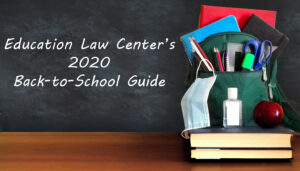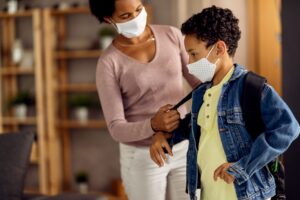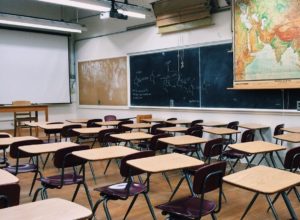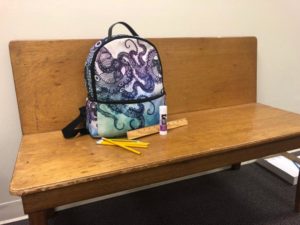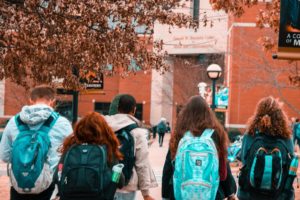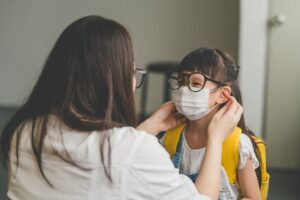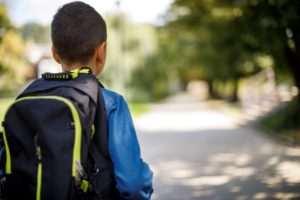ELC-PA filed a complaint with the Pennsylvania Department of Education’s Bureau of Special Education on behalf of thousands of children with disabilities who transition each year from Preschool Early Intervention to kindergarten in the School District of Philadelphia (District). The District and PDE have failed to ensure that legally-required transition processes are followed and the result has lead to a significant deprivation of rights. As a result, young children begin kindergarten in the District without an appropriate IEP in place or they do not begin kindergarten on time because an appropriate program was not timely identified, despite parents complying with transition timelines and advocating for their children. Children are deprived of a FAPE once they begin school, and their families experience significant anxiety, uncertainty, and concern for their children’s wellbeing in the months prior. ELC-PA’s complaint seeks individual and systemic relief from both the District and PDE to remedy these violations. Read the Complaint here.
Students with Disabilities
ELC-PA Files Complaint Challenging Educational Deficiencies at Philadelphia Juvenile Justice Service Center
On December 11, 2025 ELC filed a state administrative complaint against the School District of Philadelphia and the PA Dept of Education challenging continuing educational deficiencies for students with disabilities detained at the Philadelphia Juvenile Justice Service Center (“PJJSC”). The complaint was filed on behalf of individual students and all students similarly situated to remedy policies and practices that result in the denial of a free appropriate public education to these students, including unilateral changes to a youth’s school placement and significant reductions in special education services and supports. The full complaint is available here
T.B. v. School District of Philadelphia: Protecting Students from Expulsion Before Disabilities Are Identified
| Each month in 2025, we are highlighting an ELC milestone or success as we mark our 50th anniversary. See our timeline of ELC milestones here. |
| Filed in 1997, T.B. v. School District of Philadelphia was a class-action lawsuit brought by the Education Law Center-PA on behalf of students who were expelled before being evaluated for special education services. “The gist of the claim was that their behaviors were such as to suggest that they might have a disability — and that the ‘child find’ requirement of IDEA meant that the district should do a screening to determine whether a full special education evaluation was warranted,” recalled Leonard Rieser, lead attorney and former ELC-PA co-director. Case in point: The lead plaintiff, T.B. was expelled “after a long history of behavioral problems, consistent academic failure, disciplinary transfers and a request by T.B.’s mother for disability evaluation,” according to court filings. ELC-PA attorneys argued the district had failed to evaluate T.B. — and scores of other students annually — for disabilities before expelling her, despite its duty to do so under the federal Individuals with Disabilities Education Act (IDEA). IDEA’s “child find” mandate obligates school districts to identify, locate, and evaluate all children with disabilities. T.B.’s case was not a one-off. Rieser estimated that over two years, 70 students had been expelled and several hundred transferred to alternative schools without receiving evaluations that would have confirmed the need for special education services, according to a news account at the time of the lawsuit. In 1998 the district agreed to settle the lawsuit and created the Behavior Performance Review process, which Rieser described as, “essentially, a checklist of questions that school personnel were required to answer to determine whether a special education evaluation should be conducted.” The district’s current Code of Conduct refers to the process in the section on student behavior and discipline. In T.B.’s case, she was readmitted to school, evaluated, and provided special education services. T.B. was “probably one of the first cases to create an actual system for protecting kids with disabilities from expulsion, etc., before identification,” said Rieser, noting that pre-expulsion assessment requirements are now on the books in multiple states and districts. “The value of the case as I see it is that it establishes an ongoing process that reaches all kids, not just those whose parents or advocates (or teachers) know to raise the issue,” he said. |
Efforts to Dismantle the U.S. Department of Education Threaten Students with Disabilities
For Immediate Release: October 15, 2025
For More Information: Lindsay Wagner, (215) 701-4264, [email protected]
Widespread layoffs in the Office of Special Education and Rehabilitative Services (OSERS) have effectively eviscerated federal enforcement of the Individuals with Disabilities Education Act (IDEA), which requires that the U.S. Department of Education bear the ultimate responsibility for ensuring that local school districts and charter schools comply with special education laws.
OSERS, which includes the Office of Special Education Programs (OSEP), provides essential guidance, reviews and monitors state compliance with federal special education laws, and issues corrective action to states. The impact of its dismantling cannot be overstated: without staff to oversee legal compliance and equitably distribute federal funds, children with disabilities will lack critical federal protections, and become more likely to be excluded and left behind. The Department currently administers more than $15 billion in IDEA funds for special education programs nationwide; OSERS provided essential guidance to ensure effective and equitable use of those funds.
The deep slashing of OSERS’ staff is part of a broad effort by this administration to dismantle the Department of Education (“ED”) and unlawfully flout Congress’ authority; in this case, by abandoning enforcement required under IDEA, a law enacted 50 years ago next month. The IDEA guarantees all children with disabilities access to a free and appropriate education and importantly, this landmark legislation remains the law of the land, requiring continued compliance by states, school districts, and charter schools.
Schools remain legally mandated to follow both federal and state special education laws. This includes identifying and serving children with disabilities, protecting them from discrimination, and ensuring that they are educated in the least restrictive environment alongside their non-disabled peers. Importantly, Pennsylvania’s Department of Education must continue to ensure schools’ compliance with federal and state special education laws, which may now require increased oversight.
ELC-PA urges federal legislators to push back against this unlawful dismantling of OSERS and ED. Federal enforcement and oversight is needed to sustain key civil rights protections for children with disabilities. Under our Constitution, only Congress has the authority to create or eliminate federal agencies. These unlawful mass layoffs and dismantling of the Department undertaken by the executive branch will substantially diminish federal enforcement of disability laws and is a devasting setback for students with disabilities who thrive in supportive, inclusive classrooms. Without ED’s enforcement authority, state agencies that fail to meet their legal obligations could face fewer consequences and be less likely to undertake systemic reforms. However, parents will continue to bring administrative complaints and federal court actions against schools and the state to uphold the rights of their children.
We look to Congress and the courts to reject the administration’s efforts to undermine the rights of students with disabilities, restore robust federal oversight, and reaffirm the nation’s commitment to educational equity and to all students with disabilities. The time to push back is now.
###
The Education Law Center-PA (ELC-PA) is a nonprofit, legal advocacy organization with offices in Philadelphia and Pittsburgh, dedicated to ensuring that all children in Pennsylvania have access to a quality public education. Through legal representation, impact litigation, community engagement, and policy advocacy, ELC advances the rights of underserved children, including children living in poverty, children of color, children in the foster care and juvenile justice systems, children with disabilities, English learners, LGBTQ+ students, and children experiencing homelessness. For more information, visit elc-pa.org.
1992: State Ordered to Eliminate Gaps in Services for Students With Disabilities
In the early 1990s, Education Law Center-PA attorneys challenged Pennsylvania’s inadequate system for educating children with complex disabilities. The class action case upended past practices and ensured access to a continuum of educational placements and services, with direct state involvement when needed, for such students.
The case, Cordero et al. v. Pennsylvania Department of Education, was filed in U.S. District Court as a class action.
Affidavits, including one from Irish Bates, mother of Brian Cordero, gave accounts of children relegated to homebound instruction or inappropriate classes for long periods of time, even a year, while waiting for appropriate placements.
At the time, the burden fell to local districts to find placements for children whose needs could not be addressed in local public schools. But spaces in state-approved private schools were limited – or nonexistent – in less populated areas of the state. Families faced months of delay while their local districts attempted to find suitable placement.
In Pennsylvania local districts are deemed to be the front-line providers. Individual districts provide special education services, adhering to federal law and a set of state statutes and regulations promulgated by the legislature and the state Board of Education.
In Cordero, the state argued that any delays and violations of the federal law – IDEA, the Individuals with Disabilities Education Act – was the fault of the districts, not the state.
The lawsuit alleged that this system cast students with disabilities into “education limbo for an extended period,” sometimes receiving only a few hours of instruction per week.
ELC attorneys argued the state failed to meet its obligation to offer a range of education services with varied placement settings, and Judge Sylvia Rambo agreed.
The case established that the state has an unequivocal responsibility to ensure prompt access to a range of placements for children who may need a more complex set of special education supports – and ensure access to a free appropriate education in the least restrictive environment.
In a follow-up 1993 ruling, Judge Rambo ordered the state to track students who cannot find placement, determine areas of the state that lack services, increase availability of appropriate local programs, and ensure coordination between state agencies to improve services. She emphasized that regardless of a local school district’s actions, it is “the state’s obligation to ensure that the systems it put in place are running properly and that if they are not, to correct them.”
After the Cordero decision, ELC attorneys worked with the state agencies for several years on implementing it, helping establish protocols and procedures that are still in effect today.
In the end, the state Department of Education “acknowledged its responsibility to arrange programs and placements for kids whose districts were unable or had failed to do so, through a process called intensive interagency coordination,” recalled Len Rieser, former ELC executive director and one of the attorneys who litigated the case.
The Cordero ruling, he said, came as “a relief to parents – and for that matter districts – that had struggled to find options for kids with complex disabilities.”
In population centers such as Philadelphia and Pittsburgh, approved private schools – those that meet criteria to receive state funding – often educate students with more serious or particular needs. Still, said Rieser, “the emphasis of the interagency process was on keeping kids in inclusive settings, including local schools, whenever possible.”
1987: ELC Lawsuit Ensures Accommodations for Students With Disabilities
Each month in 2025, we are highlighting an ELC milestone or success as we mark our 50th anniversary. See our timeline of ELC milestones here.
ELC’s Helpline – 267-436-6095 (Eastern and Central PA), 412-258-2120 (Western PA) – has been a feature of ELC services throughout ELC’s history and played a key role in this story.
A phone call to the Education Law Center’s Helpline nearly four decades ago spurred litigation that has benefited Pennsylvania students with disabilities, including medical conditions and physical impairments.
As a result of ELC’s lawsuit and court settlement with ELC in 1997, the Pennsylvania Department of Education instructed local districts to provide such children with the services they need to attend school “safely and successfully.”
The lawsuit was Elizabeth S. v. Thomas Gilhool, Secretary of Education, filed in 1986.
Elizabeth’s parents had enrolled the child, a 5-year-old with Type 1 diabetes, in kindergarten in the Williamsport Area School District.
They asked school officials to train the classroom teachers and other staff to monitor the child’s blood-sugar levels and to provide her with snacks and/or medicine during the school day. But the district refused, telling her mother that she needed to come to school each day to support her child, and the family called ELC.
ELC filed a class-action lawsuit against the district and the state education department, alleging districts across Pennsylvania were violating students’ rights under federal law which prohibited discrimination on the basis of disability. And we were successful.
The legal theory relied on Section 504 of the Rehabilitation Act of 1973, requiring schools to provide accommodations for people with disabilities. Our case made those accommodations a reality: As a result of the lawsuit, Pennsylvania adopted Chapter 15, state regulations that implement Section 504 for students with disabilities who need school-based supports but do not require special education services.
The resulting settlement aided children with such health impairments as diabetes, heart conditions, asthma, and epilepsy as well as children with mental health issues and physical impairments including spina bifida and cerebral palsy. School districts are required to evaluate students’ needs: Some students need only minimal support, such as special transportation, while others need physical or occupational therapy or medication administered by a nurse.
When the settlement was announced, Theresa Glennon, the ELC attorney who filed the case, characterized it as a big win for a large swath of students in Pennsylvania –30,000 at the time – who had health impairments but were not in need of special education services and had been often overlooked.
“Children like Elizabeth, who can succeed in a regular education program if provided proper supports and services, will now have the equal opportunity the law requires,” she said at the time.
Contacted recently, Glennon, now professor emerita of law at Temple University Beasley School of Law, recalled the far-reaching impact of what we now commonly call 504 plans. The state ultimately implemented a system for developing 504 plans, now covering tens of thousands of Pennsylvania students.
However, Glennon warned that Section 504 is currently under attack; Texas and 16 other states have filed a lawsuit asking the court to declare it unconstitutional. The lawsuit seeks to ensure that gender dysphoria does not qualify as a disability.
ELC is committed to continue defending and effectuating the rights to services and accommodations under Section 504, enabling students to fully participate in school and thrive.
State Directs School District of Philadelphia to Award Compensatory Education, Revise Procedures for Students with Disabilities at PJJSC
In response to ELC’s systemic complaint filed in March on behalf of students with disabilities at the Philadelphia Juvenile Justice Services Center (PJJSC), the Pennsylvania Department of Education’s Bureau of Special Education recently issued a decision, finding in our favor on all seven issues raised. The ruling requires the School District of Philadelphia to determine compensatory education service awards for over 200 students and to significantly revise its process and procedures for serving students with disabilities placed at the PJJSC.
Our complaint was based on information received from partners and families that students with disabilities at PJJSC failed to receive needed services and inconsistent or intermittent access to instruction or were deprived of classroom instruction due in part to conditions of overcrowding.
The Corrective Investigation Report issued by the Department found in part that students with disabilities failed to receive special education services mandated by their IEPs, progress reports, timely re-evaluations, and that youth placed in admissions or quarantine failed to receive access to classroom instruction at all. The state ordered significant compensatory education services for individually named students and directed the District to determine compensatory education awards for over two hundred students placed at the PJJSC by October 25, 2024. As a result of our complaint and the ensuing decision, the District must also revise its procedures for: transitioning students to the PJJSC; implementing IEPs; ensuring parent participation and conducting evaluations to assess eligibility for special education services.
ELC Files Complaint Challenging Lack of Education at Allegheny County Jail
December 21, 2023 – A state administrative complaint filed today by the Education Law Center claims that school-age youths with disabilities at the Allegheny County Jail (ACJ) are not receiving a free appropriate public education in contravention of their rights.
Allegheny County Jail serves approximately 2,000 individuals each day who are awaiting adjudication of charges imposed against them. On any given day, this population includes 20-35 youths aged 15-17 and many more youths aged 18-21 years old – all of whom are entitled to a public education. A disproportionate number of these youths are likely students with disabilities who are entitled to receive a “free appropriate public education.” According to the National Disability Rights Network, young people with disabilities make up at least two-thirds of those involved in the juvenile justice system.
The complaint identifies Pittsburgh Public Schools (PPS) as the host district for students at ACJ responsible for providing educational services to school-age youths. PPS contracts with Allegheny Intermediate Unit (AIU), which manages the school program at the jail.
“ELC filed this complaint to remedy systemic policies and practices that deprive students with disabilities of their right to a free appropriate public education. These policies clearly and unequivocally violate the federal and state disability laws and, due to systemic racism, disproportionately impact Black and Brown students who are victimized most by the school-to-prison pipeline,” said Maura McInerney, legal director at Education Law Center-PA.
According to the complaint, students aged 18 years and older are denied access to the on-grounds school program. Instead, upon turning 18, these students may be offered self-guided study packets to be used completely on their own with access to a teacher once a week; or they are offered a GED program.
“Students who do not have many high school credits are urged to ‘sign themselves out’ of high school and take the GED, regardless of their disability or need for support,” said McInerney. “In one case, a 19-year-old student with significant disabilities received no education at all during his time at ACJ from March to November 2023.”
“Youths in the juvenile justice system or who are placed in adult jails like Allegheny County cannot be deprived of their right to an education, yet that is precisely what is happening here, and it must be remedied,” McInerney said.
School District of Philadelphia Ordered to Award Compensatory Education Services to Tens of Thousands of Students with Disabilities to Address COVID-Related Deprivations of FAPE
As a result of a complaint filed by ELC on behalf of all children with disabilities in the School District of Philadelphia (District), PDE’s Bureau of Special Education has ordered the District to review and assess data for all students with Individualized Education Programs (IEPs) and Section 504 accommodations plans to determine necessary make-up services, or compensatory education, owed for deprivations of a free, appropriate public education stemming from COVID school closures. Both PDE and the U.S. Department of Education have made clear that when schools closed, school districts were required to provide compensatory education for denials of the educational rights of students with disabilities. Following an investigation that spanned multiple months, PDE issued two Complaint Investigation Reports (IEP and 504) finding that the District did not provide these necessary make-up services or make required determinations for all students with disabilities. In the coming months, the District must convene IEP and Section 504 teams for more than 20,000 students with disabilities to determine the make-up services necessary to address educational deprivations stemming from the COVID closures. By September 29, the District must provide a summary of the IEP and 504 meetings and the determinations made to remedy FAPE during the pandemic. If you believe that your child is eligible for these make-up services, contact your child’s school or ELC’s Helpline for more information.
Notably, Pittsburgh Public Schools (PPS) is currently implementing “COVID Compensatory Services 2.0” to ensure that their students receive the make-up services to which they are legally entitled. You can learn more this ongoing effort at https://www.pghschools.org/ccs including a helpful Parent Pre-Meeting Planning Checklist.
ELC Testifies on Barriers to Education Success before PA Senate Education Committee
ELC staff attorney Hetal Dhagat addressed educational barriers that impact Black and Brown students, low-income students, students with disabilities, and immigrant and refugee students in testimony to the PA Senate Education Committee on April 23, 2021. She spoke at a hearing on K-12 education reforms in Western Pennsylvania, the last of three hearings that the committee has held for different regions of the state.
ELC’s testimony emphasized these issues:
- Prioritize mental health supports for students.
- Focus on supports to improve school attendance.
- Meet the needs of students with disabilities.
- Ensure that culturally and linguistically diverse families are supported.
- Ensure fair and equitable funding for public schools.
Read ELC’s testimony here.
ELC’s 2020 Back-to-School Guide for Pennsylvania Public School Students
The Education Law Center (ELC) has updated our “Back-to-School” guide for families, students, and schools. The information and fact sheets below now include COVID-related considerations for the upcoming school year.
School days during the pandemic may look very different. Students and families face unprecedented challenges. But they continue to have important education rights and protections under state and federal laws that ELC is committed to defending. Our students also remain deserving of equitable, affirming, and culturally responsive school spaces.
Black lives matter! As champions for education justice, we must grapple with the reality that for too many students and families, schools have been places of deep harm, glaring racism, and systemic oppression. Those inequities have grown more visible as schools struggle during the pandemic. At the same time, we are encouraged by increasing public attention to issues of race and disability, as many students are affected by intersectional systems of oppression.
As school resumes, ELC urges our partners, schools, and policymakers to prioritize equity and to confront the legacies of anti-Black racism and other systemic inequities in schools. Our focus is on underserved populations. Our mission is to ensure that all children in Pennsylvania have access to quality public education.
- Affirming & Safe Schools, Free from Racism
- Student Enrollment
- School Discipline
- Truancy
- Bullying & Harassment
- Students with Disabilities – IEP, 504 Plan
- Early Childhood Education
- Students Involved in Foster Care or Juvenile Justice Systems
- Students Experiencing Homelessness
- English Learners & Immigrant Students
- LGBTQ & Gender Nonconforming Students
1. AFFIRMING & SAFE SCHOOLS, FREE FROM RACISM
Back-to-School Basics
We know that schools often fail to provide equitable, safe, and affirming environments for all students, particularly students of color. Alarmingly, incidents of racial hate and abuse are on the rise. All schools in Pennsylvania should invest in anti-racist education, develop comprehensive equity policies and practices to enable students to thrive, and ensure that responses to incidents of hate address school climate as a whole. No school community is immune from the systemic and structural racism that pervades our country and culture. Educators and administrators have a legal obligation to speak out and to act to confront and prevent racial discrimination, including racist harassment in schools.
Schools are legally obligated to ensure that students are not being denied opportunities, treated differently, discriminated against, or harassed because of their race, color, national origin, or immigration status. Schools must have policies and practices to prevent and address unequal treatment like discrimination and harassment.
Need Help?
- The Right to Be Free from Racism at School
- Online and Hybrid Learning: An Equity Checklist for Schools
Say Their Names: Police brutality against Black people and other people of color is longstanding and continues to go unaddressed. But in the wake of horrific police killings of George Floyd, Breanna Taylor, and many others, a longstanding effort by students and community and civil rights groups to remove police from public schools has emerged as a path forward, with dozens of school districts severing ties with police or reducing police presence. More about this work is available from Dignity in Schools, the Advancement Project, and ACLU of Pennsylvania.
Impact of COVID-19: Black and Brown communities, hardest hit by the coronavirus, have also borne the brunt of school disruption, receiving diminished educational services. And students in underfunded school districts continue to be subjected to deplorable school building conditions, making those schools unsafe and ill-equipped to safely reopen. See ELC’s publication on toxic schools for related information.
The film “Pushout” encourages a robust response to the many ways in which a racist misunderstanding of Black girlhood leads to excessive punitive discipline and criminalization of students by schools. The film builds upon important research on the “adultification” of Black girls — a well-documented finding that Black girls are seen as less innocent and more adult-like than their white peers. This leads to Black girls being devalued, subjected to harsh, disparate treatment, and excluded from educational spaces legally charged with serving them.
Use the resources cited here and in our new fact sheet to engage with your child’s school and ensure that anti-racism, culturally responsive education, and full-school climate interventions are in place. Try to make sure that every member of the school community knows their rights and how to interrupt racism. Together, hold school leaders accountable for making this happen. Urge school and community leaders to invest in our schools, students, and communities, and disinvest from school police and punitive, exclusionary discipline.
2. STUDENT ENROLLMENT
Back-to-School Basics:
Students have the right to be enrolled in school within five days of submitting only four documents: proof of the child’s age, proof of where the child lives, immunization records, and a sworn statement of disciplinary record.
Due to potential delays in obtaining immunizations during COVID-19, the requirement to show proof of immunizations has been suspended for the first two months of the upcoming school year. Many districts are only accepting online enrollment, which requires internet access, taking pictures of enrollment documents, and uploading them online. Because it may be harder to get required documents during COVID-19 closures, families should ask the school to be flexible in what type of documents to accept and how families can send the documents to school.
Need Help?
- How to Enroll a Child in Public School
- How to Enroll a Child Living with Someone Other than Their Parent
- Enrollment Complaint Process
What’s New?
Starting this year, 2020-2021, the compulsory school age has changed, so children must be enrolled in and attending school when they are 6 years old and must attend school until age 18 (or until they graduate, whichever comes sooner).
Virtual learning at your home school or district: With many schools still operating via remote learning for some or all students, ELC has prepared a checklist as a guide to ensure that schools are serving all students equitably.
Considering a cyber charter school for your child? If you have questions about how cyber charters work, check out this recent webinar. Or visit Check Before You Choose: You will find information about teacher certification, performance ratings, supervision, and hours of instruction, and learn ways in which cyber charters differ from brick-and-mortar schools. For example, most cyber charters require a parent or guardian to serve as a learning coach for their child. For K-5, this means supervising the child’s schoolwork for an average of about five hours per day.
Cyber charter schools, like all charter schools, are public schools, required under the law to serve all students, including those with IEPs and English learners. But they may have limited experience doing so. To find out whether a cyber charter school has experience serving English learners, click here, search for the school by name, and click on the tab labeled “School Fast Facts.” To find out whether the cyber charter school serves children with your child’s type of disability, click here, scroll down to the name of the school, and click on the report for the most recent year.
3. SCHOOL DISCIPLINE
Back-to-School Basics:
Students have important rights and protections when facing exclusionary school discipline (e.g., suspension, expulsion, and disciplinary transfer). These include the right to proper notice, the right to ask questions, the right to an appropriate hearing, and in most cases, the right to receive education services in the interim and after exclusion.
Discipline will likely look different in the era of COVID-19. If your child is learning from home and the school is changing or limiting their online program, you may be entitled to rights and school discipline protections. If your child is sent home from school or told they cannot come back because they did not follow new safety and social distance rules, you still have the rights explained in the fact sheets below.
Need Help?
- Suspensions in Pennsylvania
- Expulsions in Pennsylvania
- Alternative Education for Disruptive Youth (AEDY)
- Alternative Education for Students with Disabilities
- Alternative Education for English Learners
- Student Rights to Free Speech and Expression
What’s New?
See our updated Student Rights to Free Speech and Expression fact sheet for new information and examples. Generally, a school only has the authority to restrict or punish students for speech that happens at school or a school-sponsored event or on the way to or from school. Some recent court decisions reinforced students’ rights to expression outside of school and on social media. What happens if your school is now all online with virtual classes and school-provided computer? These issues have not been directly addressed by the courts yet, but generally the same rules and standards apply to virtual classes and school activities.
4. TRUANCY
Back-to-School Basics:
Pennsylvania requires that all students go to school from age 6 until age 18 or graduation. This period is called “compulsory school age.” Legal consequences can arise when students have unexcused absences. If a student accrues three unexcused absences, they are considered “truant.” If a student has six or more unexcused absences, they are considered “habitually truant.” Schools must take steps to improve attendance for students who are habitually truant, including holding attendance improvement conferences to identify and address the reason for absences.
During COVID-19, schools are still legally required to take these steps to protect students’ rights and work with families to improve school attendance and participation. If these steps are taken and attendance does not improve, parents and students can face serious legal consequences, including fines and jail time. While ELC disagrees with these consequences, the law allows schools and decision-makers to impose them.
Need Help?
What’s New?
Changes to Pennsylvania’s compulsory school law go into effect this school year. COVID-19 has not changed this requirement. Schools are taking attendance and tracking participation, even if they are physically closed due to COVID-19. Check out your school’s website for information about how attendance will work during COVID-19 and whether changes have been made due to the pandemic.
The Pennsylvania Department of Education’s reopening guidance tells schools to consider equity and be flexible with attendance to help keep students and staff safe and to monitor for potential exposure.
5. BULLYING & HARASSMENT
Back-to-School Basics:
Bullying and harassment are serious issues that can significantly affect a child’s ability to learn. All students have the right to be free from bullying and harassment in school ‒ whether it is verbal, written, graphic, physical, or online. Pennsylvania schools are required by law to have written policies against bullying and harassment and must investigate and address complaints. Behavior may qualify as “harassment” if the offensive conduct relates to race, color, national origin/ethnicity, gender, gender identity, sexual orientation, age, disability, or religion. If your child is experiencing bullying or harassment, keep detailed records of each incident and request in writing that the school take action.
Attending a school “session” of virtual instruction while sitting at home during COVID-19 closures is still in-school time; school staff must intervene to interrupt and prevent any bullying or harassment, using developmentally appropriate interventions.
Need Help?
- What Can I Do If My Child is Bullied or Harassed? A Parent’s Guide to Advocacy in Pennsylvania Public Schools
- Cyberbullying
What’s New?
Though many schools are returning to virtual or online classes in fall 2020, students have the same rights to be free of bullying and harassment, and schools have the same obligation to promptly and effectively intervene to stop the offensive actions. For example, schools need to provide supervision and support in the online chat programs or other communications platforms they provide for accessing instruction, just as they should be supervising and intervening in bullying or harassment that may happen in the hallway or classroom at school. If a student experiences bullying or harassment in their virtual school model, follow the recommendations in our parent’s guide to collect information and report it to the school.
6. STUDENTS WITH DISABILITIES
Individualized Education Programs (IEPs)
Back-to-School Basics:
Students who have a disability that impacts their learning have the right to a “free appropriate public education” (commonly called a FAPE), a planned program of education and special services that takes account of a student’s individual needs. Special education and related services must be provided by the school free of charge. Parents have the right to participate in the special education process and consent to or refuse particular services. Students with disabilities cannot be punished for behavior that is caused by or related to their disability.
Students with disabilities and their parents still have all of these rights despite school closures and other changes related to COVID-19. Parents should be included in the creation of individualized plans for their students with disabilities to fully access remote learning, hybrid learning, or whatever plan a school develops in response to COVID-19. Students with disabilities should receive all necessary services, including related services, to address their needs.
Need Help?
- Guide for Parents and Advocates on the Right to Special Education in Pennsylvania
- Special Education Evaluations
What’s New?
As schools develop plans for reopening in response to COVID-19, students with disabilities should continue to receive the educational services that are required by their individualized plans or necessary for them to learn. If they do not, they are entitled to compensatory education. For example, if your child is required to receive weekly speech therapy, that service should still be provided weekly. Follow the recommendations in the Resolving Special Education Disagreements fact sheet if you disagree with your child’s plan developed by the school in response to COVID-19.
504 Plans
Back-to-School Basics:
If your child has a health condition, physical, mental, or behavioral impairment that “substantially limits” a “major life activity” and needs help to participate in or benefit from education or extracurricular programs, they may qualify for accommodations in school, called a “504 Plan.” Regardless of whether your child is attending school remotely or in-person due to COVID-19, your child’s 504 Plan should still provide accommodations and services that are necessary to access learning.
Need Help?
What’s New?
If you have questions or concerns about how your child’s 504 Plan is being used during remote or in-person learning, you should contact your school. Use ELC’s toolkit for strategies for requesting a 504 Plan, for guidance in getting a doctor’s letter of support, and for examples of the types of accommodations that can support students with varied health conditions.
7. EARLY CHILDHOOD EDUCATION
Back-to-School Basics
Children who receive quality early education do better in kindergarten and in school overall. Publicly funded programs such as Head Start, Early Head Start, and Pre-K Counts offer free early childcare and education programs for children from low-income families. The Early Intervention program provides additional services for children with developmental delays and disabilities at no cost to parents, regardless of income.
Need Help?
What’s New?
Young children with developmental delays and disabilities continue to have a right to early intervention services despite COVID-19 changes. Your child should still have an individualized plan that addresses developmental needs and provides educational services delivered in the appropriate manner so that your child can learn. This may be virtually, in your home, or in an early childhood education center. Learn more about whether your child is eligible for Early Intervention, how to request it, and how to design an appropriate plan by reviewing our Early Intervention FAQ (frequently asked questions).
8. STUDENTS INVOLVED IN FOSTER CARE OR JUVENILE JUSTICE SYSTEMS
Back-to-School Basics
Children involved in the foster care or juvenile justice systems have the right to a free public education, like all public school students.
Students in foster care have additional rights to ensure their school environment is stable, even if they change living arrangements. The right to “school stability” includes the right to remain in the same school even when youth change living placements, the right to enroll in a new school immediately without the required documents, and the right to have an active, involved education decisionmaker.
Students who are placed by court order in a residential facility – including students “adjudicated delinquent” – are entitled to attend the local public school in the district where the facility is located, unless certain exceptions apply.
Need Help?
- Rights of Students in Foster Care and the Juvenile Justice System
- Tips for Planning the High School Fall Semester for Youth in Foster Care
- School Stability & Immediate Enrollment of Students in Foster Care
- Toolkit for court-appointed “Educational Decision Makers” (EDMs)
What’s New?
Children and youth in the foster care and juvenile justice systems may need additional help during the COVID-19 crisis, particularly if they are in a residential placement. All youth have the right to a quality education and all the supports, equipment, and supplies needed to learn. Youth in residential facilities may need a change in placement or access to the local public school. Students with disabilities have the right to request IEP Team meetings to ensure they receive the supports and services needed to make meaningful progress and receive a free, appropriate public education. See our fact sheet for more.
Children in foster care continue to have a right to school stability and immediate enrollment, regardless of whether they are attending school in person or through remote learning. For more details, see Tips for Planning the High School Fall Semester for Youth in Foster Care.
ELC continues to advocate for the rights of students in residential placements through our class action lawsuit on behalf of students who were placed at Glen Mills Schools, where they suffered physical and emotional abuse and were deprived of their right to an education. In our case, Derrick v. Glen Mills Schools, the court upheld the right of students in the juvenile justice system to receive an appropriate and meaningful education, and ordered that the lawsuit can move forward on our claims that students were harmed by a systemic and wholesale failure to provide special education services and a legally compliant general education. The complaint contains graphic descriptions that may be hard to read; the litigation is currently in discovery stage.
9. STUDENTS EXPERIENCING HOMELESSNESS
Back-to-School Basics:
Students in all public schools, both district and charter, who are experiencing homelessness or housing instability, are entitled to school stability, and immediate enrollment in school, as well as free transportation to and from school. This includes unaccompanied students experiencing homelessness on their own. A federal law called the McKinney-Vento Act provides students experiencing homelessness a robust array of protections to ensure equal access to an education, from preschool through high school.
These protections do not have a time limit and remain in place until the student is no longer experiencing homelessness, even during COVID-19. McKinney-Vento eligible students have a right to school stability, with transportation provided until the end of the school year in which they secure permanent and adequate housing.
Need Help?
What’s New?
The McKinney-Vento Act remains in full force during the COVID-19 global pandemic.
Education Law Center helped secure and enforce an important victory for students who are experiencing homelessness on their own and have special education needs. These students do not have a way to assert their special education rights without the appointment of a surrogate parent. As a result of an ongoing complaint that ELC filed with Pennsylvania’s Bureau of Special Education, the state ordered the School District of Philadelphia to create a new system to ensure that surrogate parents are promptly appointed to students who are experiencing homelessness on their own. The district must now have a pool of at least 10 surrogate parents to meet the needs of unaccompanied students, which is a best practice used in other states. In addition to changes in Philadelphia, all PA districts have been reminded by the Pennsylvania Department of Education of their legal obligation to promptly appoint surrogate parents.
10. ENGLISH LEARNERS; STUDENTS & FAMILIES FROM LINGUISTICALLY AND CULTURALLY DIVERSE COMMUNITIES
Back-to-School Basics:
English learners have many special protections, including the right to learn English (with language instruction such as English as a Second Language or ESL), the right to supports, modifications, and accommodations in their core classes, and the right to be free from harassment based on their race, immigration status, or national origin. Parents whose first language is not English have the right to receive information about their child’s education in a language they understand.
All students have the right to attend school, regardless of their immigration status. Schools cannot ask about a student’s immigration status and cannot require a birth certificate or Social Security number before enrolling a child in school. Students and families from linguistically and culturally diverse communities should receive language services and accommodations that allow them to participate in education regardless of English proficiency.
For more information about the rights of immigrant, refugee, and asylee students and families, the U.S. Department of Education has a website with translated resources. Two factsheets are available in over ten languages on the rights of English learners to participate in educational programs and the rights of limited English proficient parents and caregivers to receive translation and interpretation for communications with school.
Need Help?
- Rights of English Learners & Limited English Proficient Parents
- Rights of Limited English Proficient Parents to Enroll Children in School
- Immigrant and Refugee Student Bill of Rights
What’s New?
Statewide school closures starting in March 2020 highlighted the ongoing challenges linguistically and culturally diverse communities experience with language access in education. As schools reopen in person, remotely, or a hybrid of both, protections for English learners, students, and families whose first language is not English, remain in force. English learners should receive language instruction to gain proficiency in reading, writing, speaking, and understanding English from certified ESL teachers. Subject teachers should provide accommodations, modifications, and support for English learners that are appropriate to each student’s age and English proficiency.
Students and families should also have information on educational programming, access to technology and meals, and health and safety protocols in languages they understand. Schools should provide interpretation and translation services to students and families whose first language is not English for general information. Schools must provide language access for parents and caregivers of students with disabilities so that parents may participate meaningfully and make educational decisions for their children.
11. LGBTQ & GENDER-NONCONFORMING STUDENTS
Back-to-School Basics:
LGBTQ and gender nonbinary or gender-nonconforming (GNC) students have the same rights as other students, including the right to be out and the right to be free from bullying and harassment. Schools must respect the right of transgender students to access facilities and programs aligned with their gender identity.
With COVID-19 school closures that require students to stay at home for virtual classes, there may be additional challenges for LGBTQ students resulting from limited access to community support, lack of in-school counseling and, in some cases, the difficult circumstances of quarantining with unsupportive family members. Schools have the obligation to support students’ social, emotional, and mental health, including via remote services and virtual meetings for a Gay Sexuality Alliance (GSA) or other student group.
If a student who is transgender, GNC, or nonbinary identifies a chosen name and pronouns, school staff should use that name and pronoun for all interactions, written and verbal, except where required by the law to use a child’s legal name. This includes providing an opportunity to correct the student’s name on any digital platforms a school is using during virtual learning (i.e. display name on Google Classroom). Purposefully and persistently misgendering a student may be harassment under the law.
Need Help?
What’s New?
The rights and protections of LGBTQ people have been clarified and affirmed at the highest level. In June 2020, the U.S. Supreme Court issued its decision in Bostock v. Clayton County, establishing that discrimination on the basis of sexual orientation and gender identity is inherently a form of illegal sex discrimination under Title VII. Courts have long analyzed Title IX about education discrimination in the same way as Title VII about employment discrimination, so this case is a powerful message for schools and LGBTQ and gender-nonconforming students too. Another appellate federal court, directly addressing the question of transgender students’ right to access bathroom facilities, held that “A public school may not punish its students for gender nonconformity. Neither may a public school harm transgender students by establishing arbitrary, separate rules for their restroom use.”
Finally, for everyone involved with public education in Pennsylvania, one of our back-to-school priorities must be to address the state’s inadequate and unfair funding of schools. Far too many children are returning to Pennsylvania schools that are lacking in resources and student supports.
Please participate in PA Schools Work, the statewide campaign for adequate and equitable funding and follow ELC on Facebook and Twitter for updates on our fair funding lawsuit against the state for failure to fund public education under the state constitution.
Please join us on September 24th as we celebrate 45 years of ensuring access to a quality public education for all children in Pennsylvania.
COVID-19 School Closures & Students with Disabilities
COVID-19 school closures have had a significant impact on students with disabilities and their families. ELC compiled this resource with 5 important things for students with disabilities and their families to know.
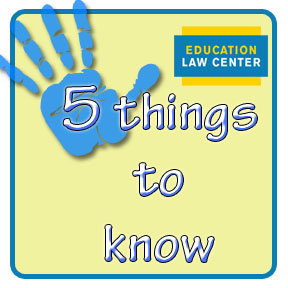
ELC Urges PA Officials to Instruct Schools On How To Ensure Equity During Closures
For immediate release: April 3, 2020
Following a March letter on concerns of educational equity signed by more than 80 organizations, a letter from the Education Law Center this week is urging Gov. Wolf and Secretary of Education Pedro Rivera to provide “clear, detailed guidance” to school districts on what steps they can take to ensure that all student populations are being supported in their education during COVID-19 school closures.
The latest letter highlights innovative strategies and promising practices that, if promoted by the Pennsylvania Department of Education, could help ensure equitable access to education for underserved student populations – including children with disabilities, English learners, children of color, children experiencing homelessness, children living in poverty, and children in the child welfare, juvenile justice and mental health systems.
“COVID-19 school closures present exceptional and daunting challenges for school administrators, teachers, staff, students and parents, as well as the Department,” the letter said, applauding state officials for their efforts to ensure continuity of education. “Your guidance at this time is essential to enabling our schools to meet these challenges as school districts, charter schools, and Intermediate Units work vigorously to meet the needs of their students.”
Detailed guidance from PDE is needed to “ensure … compliance with federal protections for vulnerable student populations, provide needed support to students and parents, and deliver individualized programming and a free appropriate public education for students with disabilities,” the letter says.
Legislation recently signed into law by Gov. Wolf, Act 13, instructs PDE to provide guidance to districts on what it means to ensure “continuity of education.” ELC’s letter asks PDE to encourage schools to provide planned instruction, rather than solely enrichment activities, and points to Pennsylvania districts that are doing so.
The letter also highlights specific strategies and recommended procedures for providing individualized planning for students with disabilities and equitable access for English learners and students experiencing homelessness, as well as ensuring continuity of education for system-involved youth in residential placements.
“We are hopeful that PDE will provide clear, detailed guidance to districts to help ensure our most underserved students can access education during COVID-19 school closures” says ELC’s legal director Maura McInerney.
Open Letter to PA Special Education Funding Commission from PA Schools Work Campaign
The Special Education Funding Commission of the Pennsylvania legislature reconvened August 27, 2019, for the first time in nearly six years to examine the impact of the 2014 funding formula that now directs state special education funding. Education Law Center joined with the statewide PA Schools Work campaign to issue an open letter with a set of recommendations to the commission for addressing the continued state underfunding of education.
Over the past decade, the state’s contribution to special education costs has dropped from a one-third share to just 22%. The letter urges a “fuller and fairer allocation of funding for special education.” The commission will be meeting and holding hearings over a three-month period.
ELC Applauds U.S. DOJ Agreement to Overhaul PA’s Alternative Education Programs to Protect Students with Disabilities and English Learners but Says Agreement Ignores Racial Disparities
The U.S. Department of Justice has reached a comprehensive agreement with the Pennsylvania Department of Education (PDE), settling a federal civil rights investigation triggered by the Education Law Center’s 2013 complaint challenging discriminatory practices in the state’s disciplinary “alternative education” programs. Read ELC’s full news release here.
The programs covered by the agreement are known as Alternative Education for Disruptive Youth (AEDY) programs. ELC’s civil rights complaint reported that at the time more than 14,000 students in Pennsylvania were segregated in the state’s 700+ approved AEDY programs.
“If the state implements and builds on what is now on paper, this new agreement has the potential to significantly transform alternative education in Pennsylvania in a positive direction,” said ELC executive director Deborah Gordon Klehr. “The Education Law Center will be working with parents, students, and other stakeholders to ensure that the detailed remedies are implemented promptly and with fidelity by the Pennsylvania Department of Education, to both protect the students already in these programs and students who could be improperly placed in them.”
Education Law Center’s complaint highlighted the high percentages of students with disabilities and African American students in AEDY programs across the state. In 82 Pennsylvania school districts, more than half the students sent to AEDY programs were students with disabilities, compared to a 16 percent special education population statewide. African American students comprised 35 percent of the students placed into alternative education programs, yet only 15 percent of Pennsylvania students.
See ELC’s fact sheet about exiting alternative education programs, with tips for parents of students with disabilities.
ELC Calls on Gov. Wolf to Propose Major Increase in Special Ed Funding
Following on our October report, “Shortchanging Children with Disabilities: State Underfunding of Special Education in Pennsylvania,” the Education Law Center wrote Gov. Tom Wolf in January, urging that his 2019-20 budget proposal include a $400 million increase in state funding for basic education and a $100 million increase in special education funding, to be distributed to districts through the existing funding formulas. Read our letter, press release, and news coverage.
Response to Rescission of Federal School Discipline Guidance and to School Safety Recommendations
The widespread problem of racial discrimination in school discipline is well documented. The 2014 federal discipline guidance from the Obama administration formally recognized that for the first time and challenged exclusionary discipline practices that disproportionately impact students of color and students with disabilities. A December 18, 2018, report from the Federal Commission on School Safety, led by Education Secretary Betsy DeVos, has called for rescinding those guidelines. ELC’s statement in response said that a decision to rescind the federal guidance as recommended is bound to allow discriminatory practices in schools to proliferate.
Three days later, on December 21, the federal government proceeded to rescind the guidance, despite widespread opposition. ELC’s statement in response is here.
PDE Orders Philadelphia School District to Create New System to Protect Students with Disabilities Experiencing Homelessness
FOR IMMEDIATE RELEASE November 30, 2018 Contact: Paul Socolar, Education Law Center, 215-906-1250, [email protected]
PDE Orders Philadelphia School District to Create New System to Protect Students with Disabilities Experiencing Homelessness
Philadelphia – ELC has secured an important victory for unaccompanied students with disabilities experiencing homelessness in Philadelphia and statewide. As a result of a complaint filed by ELC with the Pennsylvania Department of Education (PDE), these vulnerable students living on their own will have surrogate parents promptly appointed to enforce their rights in the special education system. Absent the prompt appointment of a surrogate parent, unaccompanied students under age 21 are unable to enforce their legal rights, leaving them without a mechanism to get the services they need in school. Federal law requires school districts to appoint surrogate parents within 30 days to represent unaccompanied students throughout the special education process. It also permits school districts to authorize shelter staff to serve as temporary surrogate parents until a permanent surrogate parent can be appointed. Through our partnerships with shelter providers, ELC learned of two unaccompanied students with disabilities in the School District of Philadelphia who were not assigned surrogate parents. Both suffered severe educational consequences: one student was pushed through to graduation and forced to forfeit future educational rights; the other student languished in a life-skills classroom that could not meet her needs. In response to ELC’s complaint, a state investigation revealed that both students’ rights were violated and that the District did not have an adequate system to track and assign surrogate parents. Alarmingly, it also found that the District had only assigned two surrogate parents across the District during the previous school year for all children in foster care or experiencing homelessness. In a November 8 Complaint Investigation Report, PDE’s Bureau of Special Education ordered the district to design a new system to ensure surrogate parents are appointed promptly. It also ordered PDE to issue specific guidance to all school districts about their legal obligations to assign surrogate parents. For both named students, the Bureau ordered the immediate assignment of surrogate parents and awarded compensatory education services. “The state’s action in this matter represents vital progress for unaccompanied youth with disabilities, who will now have a system that identifies and serves them,” said Paige Joki, Independence Foundation Public Interest Law Fellow at the Education Law Center. “As our clients’ cases illustrate, youth who on their own risk being pushed to graduate or being deprived of services they desperately need to succeed in life.” During the 2016-17 school year, over 4,000 students statewide were unaccompanied.
# The Education Law Center-PA (ELC) is a nonprofit, legal advocacy organization with offices in Philadelphia and Pittsburgh, dedicated to ensuring that all children in Pennsylvania have access to a quality public education. Through legal representation, impact litigation, trainings, and policy advocacy, ELC advances the rights of vulnerable children, including children living in poverty, children of color, children in the foster care and juvenile justice systems, children with disabilities, English learners, LGBTQ students, and children experiencing homelessness. For more information, visit elc-pa.org or follow on Twitter @edlawcenterpa.
ELC Joins Civil Rights Organizations in Issuing New Report Challenging Curtailment of Important Protections for Children of Color
ELC joined more than a dozen other civil rights organizations in releasing a new report highlighting the ways the Trump Administration is aggressively and intentionally limiting the civil rights protections of children and youth of color in schools. The Report was prepared by the Civil Rights Roundtable, a national coalition of organizations and academic professionals who are experts in the fields of school discipline, civil rights, and disability law. The Report analyzes recent changes in policies, regulations, and enforcement agency action which significantly impact children and youth of color, including reductions in Office of Civil Rights investigations of systemic claims, the proposed rescission of the Title VI discipline guidance, and delay and potential rescission of racial disproportionality regulations under the Individuals with Disabilities Education Act. These changes threaten to have a devastating impact on a generation of children and youth of color who are already disproportionately excluded from the classroom. The Report demonstrates that the policy, regulatory, and guidance revisions undertaken by the Trump Administration surpass the ordinary actions of a new administration and should be recognized as an intentional and substantial threat to decades of civil rights protections. The Report highlights a series of important recommendations to change this trajectory. Read the report here.
Extra info can help some gain admission
The LeGare process, established through a case filed by ELC, is intended to provide an equal opportunity for Philadelphia special education and English-learner students to get accepted to the city’s selective public high schools. Alyssa Biederman of the Philadelphia Public School Notebook explains the process. Read more here.
